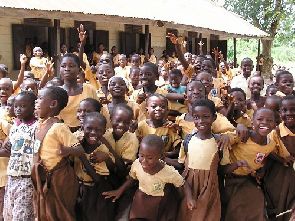 School children in Ghana
School children in Ghana
The International Federation of the Red Cross (IFRC), UNICEF and the World Health Organization (WHO), have issued new guidance to help protect children and schools from the COVID-19 infection.
The guidance, contained in a joint press release, involves practical actions and checklists for administrators, teachers, parents and children.
It advises national and local authorities on how to adapt and implement emergency plans for educational facilities, and in the event of school closures, steps to mitigate possible negative impacts on children’s learning and wellbeing.
It notes that maintaining safe school operations or reopening schools after a closure, requires many considerations, but if done well, could promote public health.
This means having solid plans in place to ensure continuity of learning, including remote learning options such as online education strategies and radio broadcasts of academic content, and access to essential services for all children.
According to the WHO, these plans should also include necessary steps for the eventual safe reopening of schools, and where schools remain open, to make sure that children and their families are protected and informed.
The guidance calls for the provision of safety information to children, with emphasis on self-protection - proper handwashing and other hygiene practices, making available hygiene supplies, as well as cleaning and disinfecting school buildings, especially water and sanitation facilities, and also increase airflow and ventilation.
The WHO says although the guidance is specific to countries that have already confirmed the transmission of COVID-19, it is relevant in all other contexts, and that education could encourage students to become advocates for disease prevention and control at home, in school, and in their communities by talking to others about how to prevent the spread of viruses.
“For example, safe school guidelines implemented in Guinea, Liberia and Sierra Leone during the outbreak of Ebola virus disease from 2014 to 2016 helped prevent school-based transmissions of the virus,” they said.
The UNICEF urges schools, whether opened or helping students through remote learning, to provide students with holistic support.
It adds that schools should provide children with vital information on handwashing and other measures to protect themselves and their families; facilitate mental health support; and help to prevent stigma and discrimination by encouraging students to be kind to each other and avoid stereotypes when talking about the virus.
The new guidance also offers helpful tips and checklists for parents and caregivers, as well as children and students themselves and these include monitoring children’s health and keeping them home from school if they were ill, encouraging children to ask questions and express their concerns; and coughing or sneezing into a tissue or your elbow and avoid touching your face, eyes, mouth and nose.